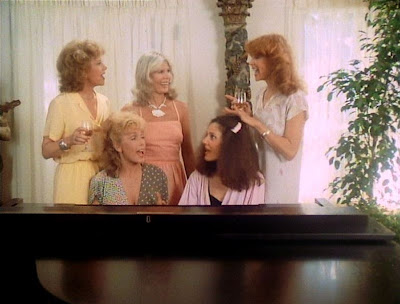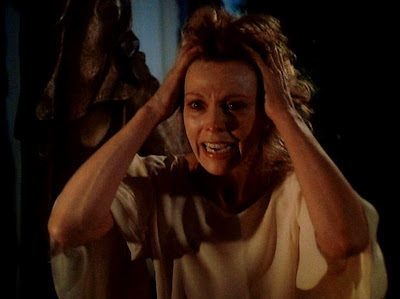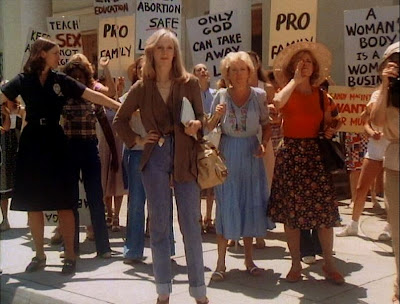There are some movies that you want to like, because an actor you always enjoy stars in it, but you ultimately conclude that you don't like it at all for a variety of reasons. The NBC-TV movie "Friendships, Secrets and Lies" (1979) is one such movie. For years, I used to rationalize that I liked it because it gave Tina Louise, whose work in movies and television I've usually enjoyed, a particularly meaty role. However, in hindsight, and with maturity and objectivity, I now realize that it's a very bad movie containing badly written characters and proffering themes that I personally don't agree with. It's a shame, because the movie contains a provocative and potentially interesting premise and has a cast of committed and talented actresses who appear to be engaged by the ostensibly substantial roles offered to them in the script, but are ultimately undermined by the unfocused agenda of its muddled filmmakers.
In the small college town of Arconia, the skeletal remains of a baby are found at the bottom of an air shaft at the old Kappa Beta Chi sorority house. An examination of the bones suggest that the remains have been there for at least 20 years. The only time when the air shaft was ever open was for repairs to remove dry rot during one summer in 1956 when six sorority sisters were living there over the summer term. As authorities investigate the bones as part of a potential homicide investigation, eager beaver local newspaper reporter Jessie Dunn (Sondra Locke) prints a newspaper article listing the names of the six women who stayed there that summer, all of whom still live in Arconia. The former sorority sisters reunite as they find themselves at the center of a police investigation as well as the abortion debate.
The women include local newspaper editor Martha Plowden (Cathryn Damon), whose husband Frank has left her for a younger woman Layne (Cathie Shirriff); happily married B.J. (Loretta Swit) who is busy raising a large family and has just learned that she's expecting another baby; widowed Joan Holmes (Tina Louise) who got by on her looks while in school and has just learned that her late poet husband may have had an affair while they were all in school with promiscuous Sandy McIntosh (Paula Prentiss) a blithe divorcee and single mother who now teaches ballet; never-married dress shop owner Mary Alice Friday (Shelley Fabares), who has been hiding the fact that she's a lesbian from her other sorority sisters; and beauty salon owner Edyth (Stella Stevens), who is being beaten and abused by her drunken husband Miley.
At the time the movie was made, the movie was heavily promoted by NBC that it was written, produced and directed by women, featured an all-female cast, and had an almost all female crew. It was a film obviously made with sincere intentions in order to allow women more opportunities in film and television to play substantial roles, both in front of and behind the cameras. But "Friendships, Secrets and Lies" is continually undermined by an overly earnest and general air of mediocrity that runs rampant throughout. The main problem with the movie lies with the terrible direction by Marlena Laird and Ann Zane Shanks, which results in a movie featuring uneven performances, poor editing, and awkward camerawork and blocking. There are a couple of scenes in the movie where shots are cobbled together from different takes and different angles of the same scene where the tone of performances between the different shots don't match up. As such, in a couple of scenes, as you cut from one angle to another, the facial expressions and the tone of the actresses' voices between two different shots are so contradictory, and at such odds with one another, that it feels like the character's mood has changed in a split second.
Years ago, I interviewed Stella Stevens about her 1960s film career and we talked about "Friendships, Secrets and Lies." She explained that the reason why two directors are credited with the movie is because one didn't work out and the actors ended up directing each others' performances. When the original director was replaced, the actors vowed to ignore the new director and continue directing each other. Unfortunately, without a strong director at the helm, "Friendships, Secrets and Lies" was destined to fail. Stevens revealed that the producer of the movie later confided in her that, if the director was a man, she would have replaced him right away. As Stevens recalled, "We just wanted to prove that women could direct, but the producer let that director work longer than she would have before firing her, when she should've just treated her like a man. But she didn't. And that's what's wrong: they treat women like women and men like men. They should treat people like people."
In my humble opinion, "Friendships, Secrets and Lies" suffers because of the manner in which the producer treated the initial director differently on the basis of her gender, rather than ensuring that the best qualified person was hired to direct the movie. In so doing, the personnel in charge of the movie undermined their intended goal of helping to broaden the opportunities for women in filmmaking by not holding the first director accountable to do good work. (One wonders why the more experienced Karen Arthur, Randa Haines, Lee Grant, or Gwen Arner weren't hired to direct this film.) Without a strong director at the helm, many of the performances are all over the map. I generally like Stella Stevens, Paula Prentiss, and Tina Louise, but they aren't allowed to play to their strengths throughout this film. Stevens' character Edyth requires her to be timid and victimized, in contrast to her usually spirited and feisty personality. Stevens is a talented actress who does indeed have the ability to play roles outside her expected range, but she isn't given enough guidance from the director to allow her to fully explore the character without coming across as mannered, awkward, and whiny at times. Stevens is also undermined by one of the most ridiculous scenes in the movie. In order to maintain the pointless and stupid "all-female cast" gimmick, which only brings an air of artificiality to the proceedings, in the scene where Edyth is being physically abused by her drunken husband Miley, we see Stevens facing the camera, as if confronting her husband, stagger off camera so that we hear her being physically assaulted by her never-seen husband, and then have her pushed back into camera range bruised and abused. The scene plays as awkwardly as it reads.
Paula Prentiss is usually funny and quick-witted, but her role as Sandy is callous, presumptuous, and mean-spirited. The central premise concerning the discovery of the skeleton of a dead baby ought to evoke a level of compassion out of most individuals, whether you're pro-life or pro-choice, but Prentiss' Sandy loses our compassion and respect when she proves herself to be insensitive concerning the circumstances surrounding the skeleton. As Tina Louise's character Joan expresses sadness at hearing about the skeleton, Sandy dismisses her feelings by derisively telling her "Joan, don't get maudlin." When Joan makes the case that it's a tragic occurrence, Sandy continues expressing cynicism and nihilism by wise-cracking "So's Shakespeare." Upon learning that Sandy may have seduced both Joan and Martha's husbands while in college, something that she doesn't feel particularly sorry about even though this has clearly hurt both Martha and Joan, you realize that she doesn't have feelings for anyone but herself. When Sandy is unfairly accused later in the film of having aborted the baby, which causes her young daughter (Kim Richards) to run away, the sympathy that her character ought to elicit simply does not come through. It's hard to feel sorry for a character who lacks a conscience and doesn't have any compassion for other people. Paula Prentiss, an actress ideal for portraying sparkling whimsy instead of biting sarcasm, is miscast as Sandy. Sandy is an ugly, mean-spirited individual that only an actress as skillful at playing narcissistic nihilism as Tuesday Weld could have pulled off.
Tina Louise is given a more substantial role than usual in this film, but ends up overacting in most of her scenes. I have blogged before that her best moments as an actress are the quiet, low-key moments where she underplays and wrings out the nuance in even the most unlikely material. That isn't the case in "Friendships, Secrets and Lies." I almost feel that Louise is so eager to overcome her "Gilligan's Island" typecasting and demonstrate what she is capable of that she's like a horse that's out of its gate before its ready to hit the track. There's a level of enthusiasm that Louise brings to the material that you can't fault her for, but she doesn't know when to reign it in at times. The result is that, given a relatively good part for a change, she ends up going out of her mind as an actress in ways we've never seen before.
In one scene, Louise's character Joan confronts Prentiss's character Sandy at her dance studio with evidence that Sandy had an affair with Joan's husband while they were still in college. Louise glares like a Madwoman throughout this sequence, her eyes blazing with excited, maniacal energy, especially when she spits in Paula Prentiss' face. In another scene, when most of the women are at Edyth's beauty salon while a pro-choice/pro-life demonstration is taking place outside in the streets, Louise walks around the salon absent-mindedly giggling to herself, sipping booze from a glass, and running a comb through her hair. In his review of the film, the New York Times' television critic John J. O'Connor recalls this moment as "one of several ludicrous scenes. As a distraught Tina Louise staggers about a beauty shop in what looks like Ophelia's mad scene, a friend sweetly asks 'Are you sure you're all right?' Miss Louise starts smashing everyone in sight with her outsized pocketbook and Stella Stevens stands by with a black eye from her wife-beating husband, while Cathryn Damon clutches her head in disbelief. Miss Damon's plight is understandable."
In yet another scene, as Tina Louise's character is burning her husband's papers in the fireplace, she tells her teenage daughter all about her regrets in life, how she used to try and get by on just her looks, and urges her daughter to "think like a man. Work like a man. I never did my studies. I never learned how to work. I can't even discipline myself to stay on a stupid diet! I only learned how to flirt, and how to be 'Pretty Joan.' 'Isn't Joan the prettiest girl in town?! Isn't Joan the lady?!' That's what they used to say about me! And I counted on that, I counted on that to get me by. It got me by all right. (She cackles maniacally.) It got me right by life!" All of these scenes should have been Louise's tour-de-force as an actress but, even though her heart is in the right place, she undermines herself by not pulling back and finding the humanity in Joan in order to demonstrate genuine feeling instead of being broadly mannered. These scenes come off more like acting sessions with Strasberg at the Actors Studio rather than genuine moments out of the life of a believable individual.
Fortunately, the rest of the cast does better with the weak material. Cathryn Damon is touching and sincere as the ostensibly sensible level-headed Martha. Damon does a good job at demonstrating the years of regret that her character has from spending her life putting her ex-husband's needs before her own. What I like about Damon's performance is that she is able to make Martha a sympathetic and understandable character, even as the script makes it clear that she allowed herself to be victimized by her husband because of the bad choices she has made. Shelley Fabares is also good as the closeted lesbian Mary Alice. Fabares doesn't allow the character to slip into any stereotypes so that Mary Alice remains a generally believable individual throughout the movie. Sondra Locke is a bit annoying at times as the eager-beaver newspaper reporter Jessie Dunn, but this is more due to the one-dimensional script that allows the self-serving Jessie to be insensitive to how her reporting is tearing apart the lives of the sorority sisters than anything to do with Locke's performance, which is generally good throughout the movie.
Best of all is "M*A*S*H" star Loretta Swit as BJ, the only truly happy and content sorority sister from Kappa Beta Chi. Swit gives a terrific performance as the one sorority sister who is a genuine friend to all the others, who are too weak, self-centered, malicious, or manipulative to really think of anyone but themselves. What I find a bit ironic, and which demonstrates the muddled intention of the filmmakers, is that the BJ character is the one person in the whole film who is against abortion and has a pro-life perspective. However, BJ is not denigrated for having this perspective and so her position is given its due. She is portrayed as a non-judgmental individual who is against abortion, but has compassion for whichever sorority sister had the baby. The filmmakers play fair with BJ by making her a grounded individual who is happy with her own marriage and family life as a mother and homemaker, and she isn't demonized by them even though she is clearly at odds with their apparent pro-choice agenda. Nevertheless, the filmmakers ultimately undermine themselves by making most of the other characters, who share their pro-choice perspective--such as Sandy Jessie, and Mary Alice--unsympathetic, smug, and timid individuals. (For the record, I am not advocating for either a pro-life or pro-choice perspective because the purpose of this blog is to remain as apolitical as possible.) Anyone who has ever watched "Friendships, Secrets and Lies" can sense that the filmmakers themselves are vehemently pro-choice. The fact that they aren't even able to have the characters that voice their perspective come across effectively demonstrates the extent of their bad filmmaking.
What I ultimately don't like about "Friendships, Secrets and Lies" is how it presumes that the pro-choice/pro-life debate is the only, only issue of importance to women. While I acknowledge that the ongoing debate between pro-choice and pro-life is indeed a very important issue concerning women (and I also acknowledge that the film's central storyline naturally preordains that the movie focuses primarily on this issue) at no point in "Friendships, Secrets and Lies" do the women express interest in equal opportunities regarding employment or pay, geopolitical or economic concerns, civil rights for people of color and other ethnicities, or other issues of substance affecting the world in 1979. In that sense, I actually consider "Friendships, Secrets and Lies" a movie that condescends to women by not allowing them to consider a broader perspective on the world they live in. Moreover, except for Loretta Swit's happily married BJ, almost all the women in this story are victims. Martha is a victim of her philandering ex-husband Frank, Edyth is a victim of her physically abusive husband Miley, Joan is a victim of being objectified because of her fading good looks, Mary Alice is a victim of having to hide her lesbianism from everyone in town, and Sandy is victimized by her own promiscuous past and by pro-life protestors who assume that the baby was hers. Most of the characters are so one-dimensional that it's not hard to figure out who was the sorority sister who had the baby. The mystery aspect of the movie never really works because the characters are so transparent. In so doing, I actually feel that the filmmakers responsible for "Friendships, Secrets and Lies" have actually undermined women by limiting their portrayal to the sorts of traditional, confining gender stereotypes that many have long sought to overcome. This film never takes a broader perspective that recognizes the ever-widening interests and concerns of women in the last several decades. The unfortunate irony is that, despite the intentions of its filmmakers, "Friendships, Secrets and Lies," both on-screen and off, reinforces the narrow stereotypes that have at times hindered women throughout history, rather than offering new perspectives and opportunities for them.















It's been a long time since I saw this movie, but I certainly remember parts of the film that were poorly executed. As far as women in films (I know it was made for television, but still...) I think it's important to remember how few good roles their were for women in those years when Barbra Streisand was about the only actress who had any vehicles created for her in the major studios. Pictures about mature women were just coming into vogue again ("Julia", "The Turning Point", "An Unmarried Woman" after a long trail of "buddy movies" and disaster flicks. So before 1978 if you didn't get work in one of Robert Altman's admittedly eccentric films, and a woman above 30, good luck! Driving around in a Trans Am with Burt Reynolds was the best Sally Field could do. As I stated I'd have to see this movie again, but it may well be the case that a good director could have made this one a truly memorable film instead of a "what if?" with a few good scenes.
ReplyDeleteGreat review and analysis. I have never seen the movie and, frankly, would not watch it givent he opportunity now that I have read your review. It is too bad about Ms. Louise, as I know from other reviews that you admire her--and her film work-- greatly. It had to be somewhat difficult and painful for you to write this piece, which is quite critical of her effort. Of course, that makes your review that much more credible.
ReplyDelete